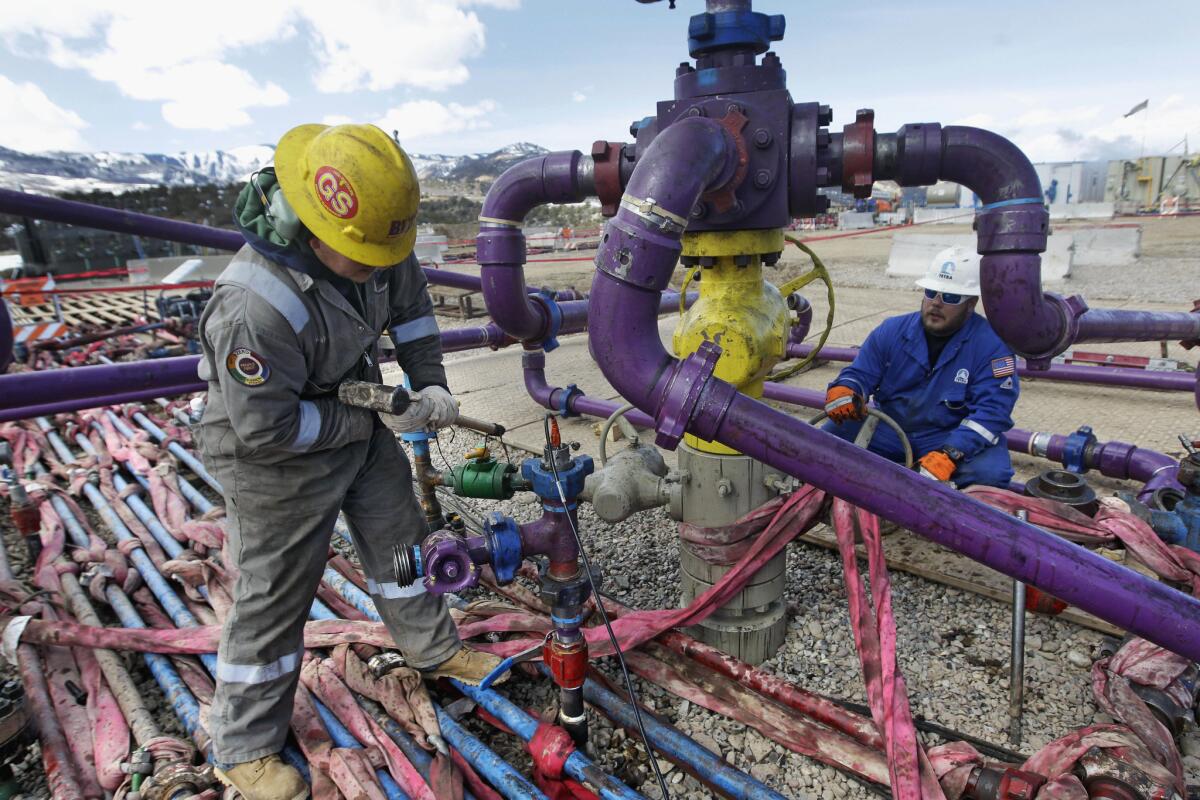In the fight over fracking, Colorado state laws trump local bans, court rules

Workers tend to a wellhead during a hydraulic fracturing operation outside Rifle, in western Colorado, in 2013.
The Colorado Supreme Court on Monday ruled that state law overrides local efforts to limit hydraulic fracturing, dealing a setback to opponents of oil and gas development but potentially adding momentum to a broader fight that could play out at the ballot box this fall.
The ruling rejected as “invalid and unenforceable” measures that were approved by voters in two cities north of Denver, an area where hydraulic fracturing, or fracking, surged for many years before low oil prices prompted a steep slowdown.
In 2012, residents of Longmont voted to ban fracking within the city limits. The following year, voters in Fort Collins approved of a five-year moratorium there.
The oil industry and the state took both cities to court, arguing that the power to regulate the industry belonged to the state. Lower courts agreed, but the cities appealed, eventually sending the case to the state’s highest court.
The industry praised Monday’s decision, with a lawyer for the Colorado Oil and Gas Assn. telling reporters that the ruling drew “a bright line” affirming state authority. Opponents said it would motivate activists who are collecting signatures to put several anti-fracking measures on the state ballot this fall.
The measures, which would change state law, include giving regulatory power to local governments and requiring fracking activity to be substantially farther away from homes, schools and churches than is currently allowed.
NEWSLETTER: Get the day’s top headlines from Times Editor Davan Maharaj >>
“The trend has been to prioritize oil and gas profits over the rights of people to protect our communities,” said Lauren Petrie, the Rocky Mountain regional director for Food and Water Watch. “The industry and the state are just shoving it down people’s throats.”
The group is supporting Initiative 75, which would give local governments the right to ban fracking to protect public health and safety. The initiative needs nearly 100,000 signatures by August to qualify for the November ballot.
“It’s going to be the biggest environmental fight in the country,” Petrie said.
Michael Freeman, a lawyer for Earthjustice, says that in Colorado the oil and gas industry operates under legal precedents that do not properly factor in the rise of new fracking technology and its expansion into urban and suburban areas.
“Case law has not really evolved to recognize the reality of drilling in 2016,” he said.
Other cities and counties nationwide have passed resolutions, bans or moratoriums on fracking. State leaders in Vermont and New York have banned fracking, and in some states, including Texas, lawmakers or courts have in effect imposed bans.
Dan Haley, president and chief executive of the Colorado Oil and Gas Assn., told reporters in a conference call Monday that a ballot fight over fracking would “disrupt Colorado’s economy” and “shred the private property rights” of Colorado citizens.
ALSO
Woman files lawsuit claiming Starbucks overfills cold drinks with ice
Anti-Trump protester charged with trashing CHP cruiser, urging others to vandalize
In a down-on-its-luck Oregon mill town, the savior they’re waiting for is Donald Trump
More to Read
Start your day right
Sign up for Essential California for news, features and recommendations from the L.A. Times and beyond in your inbox six days a week.
You may occasionally receive promotional content from the Los Angeles Times.







